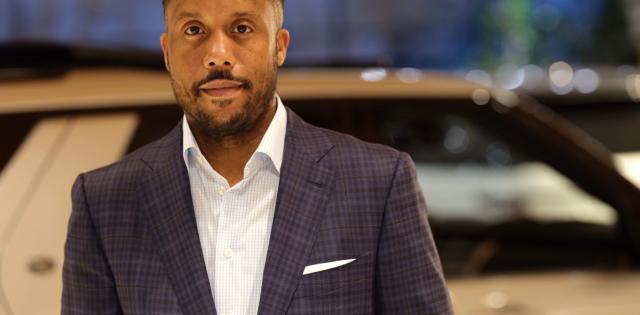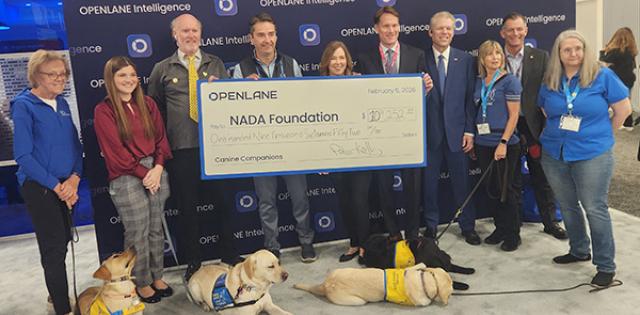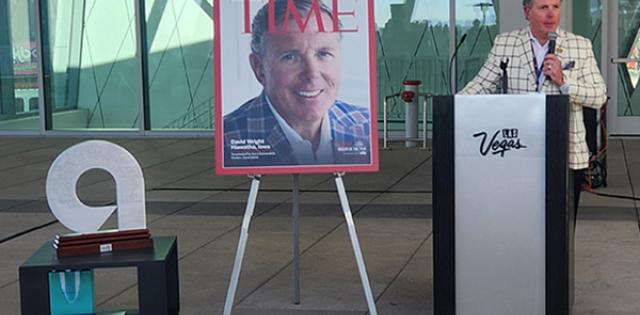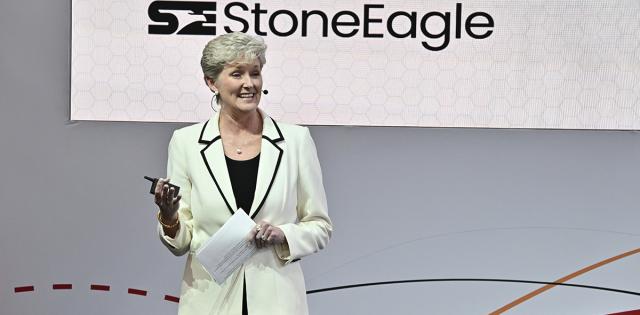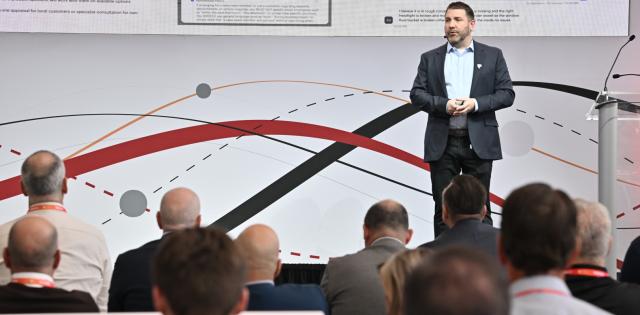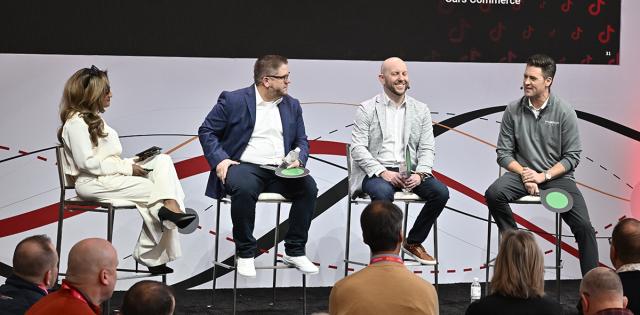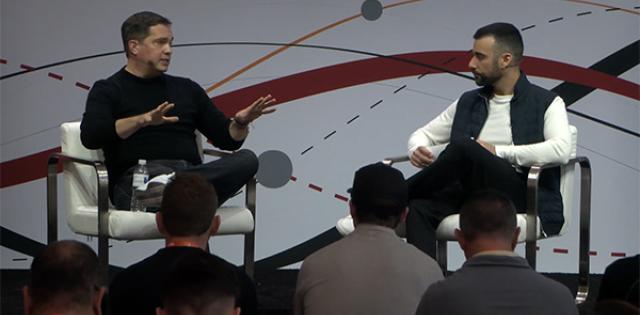It’s 1923 in Champaign, Ill., population 15,873. The cost of a new suit from Jos. Kuhn & Co. will run you $37.50. A pound of pork chops from Abbott & Wells on Main St. will cost you 20 cents. And if you want a new Chevrolet Superior Utility Coupe — with its extra-wide doors, high hood and single seat with room for two — head down to the Flatiron Building on North Hickory St. to the new Parkhill Motor Sales where it’s available for the low price of $680.
According to David Parkhill—the great-grandson of T.D. Parkhill and current dealership president—T.D. was a “real entrepreneur.” He dabbled in the car business and owned a bakery and hardware store in southern Illinois, but coal mine labor strife forced him to move his family of 10 northward to Champaign in 1917 and make a serious go of it in the automobile business.
Sullivan Comes to Town
Parkhill Motor Sales sold Chevrolets from 1923 to 1927, but T.D. had a disagreement with Chevrolet over the wooden wheels. Since the company stored cars in a Chicago stockyard, the manure would warp the wooden wheels. T.D. gave back the franchise.
Other dealerships in town tried their hand at selling Chevys until 1932, when Giles Sullivan decided to trade in his small dealership in Sedalia, Mo., and move to Champaign to become the area’s Chevrolet dealership, which has now been in business for more than 92 years.
“He had his choice between Champaign and a little dirt town named Miami in Florida,” his grandson Kevin Sullivan says. “We’re grateful that he chose (Champaign).”
Giles’ introduction to the automotive industry was as a collection repo man for GMAC. A former college football player at Kansas State who flew planes in World War I, he could more than hold his own.
With far fewer cars rolling out of Michigan and other Midwest hubs during the Depression, there wasn’t much to sell. So Giles and the four key service people he brought with him from Missouri put most of their energy into that part of the business. When it came to selling, they got creative.
“There was no sitting in the showroom waiting on somebody to buy a car or spending much money on advertising,” Kevin says. “In those days, they would drop the salespeople off in different parts of the community and they would knock on doors, go door to door, trying to sell cars.”
It worked. In June 1936, with the worst of the Depression now in the rear-view mirror, Sullivan Chevrolet became the first dealership in Champaign-Urbana to sell 100 cars in a single month.
Wartime Survival, Postwar Boom
From February 1942 to October 1945, no cars, commercial trucks or auto parts were produced. Instead, Ford B-24 bombers, Cadillac tanks, Buick airplane engines and Oldsmobile bullets were pumped out by the automakers to help win World War II. Even new tires were restricted to vehicles used for public health and safety, public transportation, and essential purposes, like the delivery of food, fuel and ice.
“People were putting their cars up on blocks because they couldn’t get tires,” says T.D.’s grandson Bergen Parkhill.
“Rationing went into effect and that affected gasoline. My mother took more rationing coupons to the grocery store than she did money. In car production, it was down to maintenance, service work—and there were only a certain amount of parts available.”
Both Champaign dealerships survived, through skeleton crews, used-car sales and, in Parkhill Motors’ case, running a gas station on its lot.
Sullivan built a new service facility in 1949 and then in 1954 remodeled its original showroom, now featuring Corvettes. Parkhill added Triumph, Peugeot and Renault from 1958 to 1966.
“The car business was fun in the ’50s and ’60s,” says Bergen, who co-owned the Parkhill business with cousins Robert and Richard Parkhill starting in 1968. “People [were] excited about cars… and there was a lot of difference in cars back then.”
Making Moves
Long before the idea of the two families joining forces ever crossed anyone’s mind, Sullivan Chevrolet and Parkhill Motor Sales each made major moves—Sullivan to North Walnut Street in 1962 and Parkhill to Carriage Center Court in 1969.
What Sullivan’s new location lacked in neighborhood charm—the cars were kept inside barbed-wire fencing—it more than made up for in building amenities. Namely, its flat, sturdy roof.
Kevin can’t remember who came up with the idea to put a new car up there every September, when Chevrolet would introduce its new line, but he’ll never forget the hubbub it created, before and after he joined the family business in 1978.
The changing of the cars on the dealership roof was quite the spectacle, often garnering public, and sometimes media, attention. The process would usually involve road closures as well as a crane.
“They probably had to push it off [the roof] because the battery wasn’t any good by then—and then we’d put a new one on,” Kevin says. “People sometimes wanted to buy the one that came off the roof. It was special because it was a ‘Sullivan Chevrolet car on the roof.’ That was our trademark—it was our logo; it was on our stationery; it made us different from everybody else.”
Seven years after Sullivan’s big move to North Walnut, it was Parkhill’s turn. Cy Vaughn, a well-known commercial real estate agent, approached three local automobile dealers in town—the Parkhills included—and got them to think about moving to a 40-acre parcel, pushing the auto mall concept that had been working well in Riverside, Calif. The four businesses went back to their respective manufacturers. They ended up buying the land in 1967, started construction in 1968 and moved in on August 1, 1969.
“It was a good move for us. We really weren’t thinking that way at the time, but Cy Vaughn was absolutely right,” Bergen says. “Worden-Martin was sitting up there on Springfield Avenue, Hill Ford was in the old Cochrane Building on University Avenue, and we were down at 702 South Neil, where we’d been since the 1920s.”
It would be Parkhill Motor Sales’ home for 33 years, representing “a huge leap in facilities, a major upgrade as the retail part of the business had started to grow,” says David.
Good Times, Tough Times
Kevin’s post-graduation plan was to return to Champaign in 1978, learn how to sell cars, then move back to Milwaukee. But it didn’t quite turn out that way. “I graduated on a Saturday and started work on a Monday” at the dealership, now led by his father, Jim, following Giles’ passing in 1976.
Selling cars, Kevin soon realized, was “fun,” much more so than working in Sullivan Chevrolet’s service or finance departments, which he had for a brief time. “I made a pretty good living by hustling and meeting new people. I made so many relationships with three different generations from the same family. I had a customer tell me one time he grew up thinking that Sullivan’s made Chevrolets because to them, it was like: That’s it. Just go down to Sullivan’s to get a new car,” he says.
The late 1970s and early 1980s represented a gauntlet for automobile dealers. First came the 1979 oil crisis, leading to fuel shortages and long lines at gas stations. Then came back-to-back recessions—the first in 1980, which took a toll on dealerships from coast to coast. Soaring interest rates and high vehicle prices combined to knock out a record number of U.S. auto dealers during the 1980 model year.
“I remember holding a sales meeting back then and saying, ‘Boys, we can’t last over 30 or 60 days if we have to pay 20% for floor plan,’” says Bergen. “Well, fortunately, [Ronald] Reagan came into office and it all changed.”
Then, in 1983, Parkhill Motor Sales added one of the industry’s crown jewels—a Mercedes-Benz franchise. Four years later, Sullivan Chevrolet—now also selling Volvos and led by new general manager Kevin—moved into its third home, a spacious building on Anthony Drive off Interstate 74 and viewable to thousands of new potential customers a day. Business was good.
For his gift after graduating from Indiana University, David was presented with a brand-new 1984 Cutlass Supreme—which he proceeded to drive to Colorado to begin a career in banking. Still, he says, “I wanted to run a business and own a business. I had grown up here and liked the car business, what I knew of it, so I moved back here in 1991.”
David had been back for seven years when the next new colossal challenge arose for the business, just after Parkhill Motor Sales celebrated its 75th anniversary, officially cementing the company’s status as Champaign County’s oldest new-car dealer.
Project 2000
Word came down from corporate headquarters that General Motors wanted dealerships in the same market to consolidate. “It was called Project 2000,” David says.
Sullivan Chevrolet was the only compatible partner in town for Parkhill, but it had Volvo, which Chevrolet didn’t want in its stores. And “Oldsmobile and Cadillac did not want Mercedes-Benz in there,” says David. “We had to pivot as a company. We spent a lot of time figuring out how we were going to do that.”
In the end, it was decided that the merger of the two would create Sullivan-Parkhill Automotive, Inc., at 440 West Anthony Drive—the region’s largest Chevrolet, Oldsmobile and Cadillac dealer—and Sullivan-Parkhill Imports, Inc., selling Mercedes-Benz and Volvo vehicles from 401 West Marketview Drive.
Bergen Parkhill and Jim Sullivan would step aside, turning over the keys to David Parkhill and his cousin John as vice presidents and Kevin Sullivan as president.
“It was really a good merger,” Kevin says. “There were no ego issues.”
A New Company for a New Millennium
Since then, the company experienced the advent of the internet, a Chapter 11 reorganization of GM as a result of the Great Recession in 2009, the addition of Sprinter vans to its lineup in 2013, then COVID in 2020.
“Multigenerational businesses are complex,” says David Parkhill, the 2023 Illinois Automobile Dealers Association chairman. “A lot of them fail. But not this one.”
For more stories like this, bookmark www.NADAheadlines.org as a favorite in the browser of your choice and subscribe to our newsletter here:


